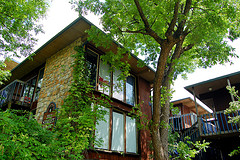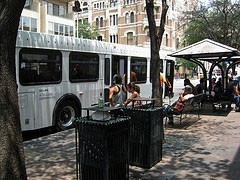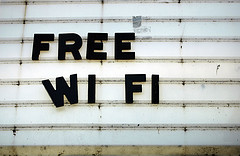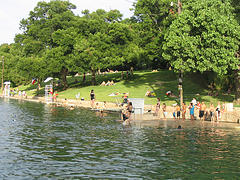Life in Austin
- Education
- Outreach Events
- PhD Programs
- Master's Programs
- Post-Doctoral Fellowships
- Scholarships
- Visiting UT Austin
- UT Austin PhD Programs
- Visiting Researchers
- Digital Media Internships
- Digital Media Mobility Awards
-
 Life in Austin
Life in Austin
- More Opportunities
Interdisciplinary research,
education and capacity building
If you talk with any Austinite you'll notice how proud we are of our city. The self-described Live Music Capital of the World is known for its natural beauty, its entrepreneurial business climate and a fiercely independent cultural scene determined to "Keep Austin Weird."
Here are a few resources and tips to help you enjoy your stay in Austin.
Housing - Transportation - Health Insurance - Banking - Communications - Exploring Austin
Housing
 The Office of the Provost offers a very useful guide to finding housing in Austin, including questions to ask before renting and listings of apartments available for rent.
The Office of the Provost offers a very useful guide to finding housing in Austin, including questions to ask before renting and listings of apartments available for rent.
Members of the Portugueses em Austin Facebook group have collected their advice in a shared document, Alojamento em Austin.
Many apartment locator services operate in Austin. Although they do not charge a direct fee to renters, be aware that the apartment owner pays a fee which will be reflected in the price.
You can find individual apartments, houses and roommate situations listed in Austin Craigslist. Be sure to follow Craigslist's advice on how to avoid scams and fraud.
Craiglist is also a convenient place to find used furniture and housewares, as are the many garage and yard sales at private homes all over Austin on any sunny weekend.
For an immersion experience in American student culture, consider the College Houses Cooperatives. The cooperatives include seven houses in the West Campus area with different structures for pricing, meals and volunteer hours. Although they are primarily for students and rent by the semester, some shorter-term arrangements for other visitors may be possible when space is available.
Transportation
Mass transit
 Austin’s transit system is known as Capital Metro and it includes bus service and one rail line. Those holding a University of Texas ID card may use the transit system for free. UT Austin visitors staying for more than two weeks may be eligible to obtain an ID.
Austin’s transit system is known as Capital Metro and it includes bus service and one rail line. Those holding a University of Texas ID card may use the transit system for free. UT Austin visitors staying for more than two weeks may be eligible to obtain an ID.
http://www.capmetro.org/
The CapMetro website includes schedules and maps and a "trip planner" interface, or you can plan Cap Metro trips using Google Transit.
CapMetro buses have racks on the front for bicycles.
Bicycling
Austin has many specialty cycling shops but for a basic bike you may try the sporting goods sections of stores like Target or Academy Sports, which offer new bikes for as low as $80. Used bikes can be found on Craigslist.
U-locks are essential to prevent bike theft. As an additional deterrent to thieves, UT requires that all bikes parked on campus must be registered. See the UT biking site for registration instructions.
Front and rear lights are a necessity for safe cycling at night and are required by Texas law. If you're planning to ride at night, you should have a flashing white light on the front of your bike and a flashing red light on the rear. The police have been known to cite cyclists who do not have bright enough lights, so make sure the lights are rated at 200 feet/60 meters or greater. Any bike store will carry lights. A set of front and rear lights should cost about $30 (example). Be sure to check your batteries before you go out!
Bicycle maps are available from a number of sources:
- The City of Austin’s bicycle site includes a Bicycle Route Map with routes graded by ease of use. It is available for sale in bike shops.
- UT offers a map that combines bus and bicycle routes to campus.
- Google Maps provides directions for cycling in addition to driving, walking or taking the bus.
BicycleAustin.info has lots of useful information, including an important summary of Austin's bike laws.
Ridesharing
As of this writing, Uber and Lyft do not operate in Austin following a dispute over safety regulations. Locally available alternatives include Fasten, Fare, and RideAustin.
Renting a car
National car rental agencies such as Hertz, Enterprise, Avis and National are easily found in Austin and may be the best solution for very short-term visitors. A local rental agency which offers rentals by the week or the month is Longhorn Rentals, 512-452-1773.
A local auto mechanic who rents out older cars by the month is Flamingo Automotive, 3512 Guadalupe Street, tel. 512-459-9917.
Long-term visitors who only need a car occasionally may want to consider a car sharing service like ZipCar (affiliated with UT Austin) or Car2Go. These services include insurance as well as gas and mileage in the car fees. Car2Go requires a Texas driver's license, but ZipCar accepts foreign licenses with proper documentation.
Buying a car
While CapMetro service covers many areas of Austin, especially those downtown and in the campus area, visitors staying for several months under a J-1 or F-1 visa may consider purchasing a car. Online classified ad sites like Craigslist offer cars of varying conditions and prices. Services like Carfax.com and is-it-a-lemon.com will give reports on a specific car’s accident history and other potential flaws, generally for a fee.
Texas law requires all drivers to carry a minimum amount of insurance. Although holders of Portuguese driver's licenses may drive under these licenses for up to a year, insurers generally require drivers to hold a Texas license. The UT International Office advises visitors to obtain a license before purchasing and insuring a car. To get a Texas license visitors must take written and driving tests and present their passport, DS-2019 or I-20 card, a letter from UT attesting to official status as a visiting researcher or student, and a US social security card, if available. The International Office site has more detailed suggestions on how to buy a car and the Texas Department of Public Safety site has more information on how to get a Texas driver's license.
Health insurance
Any visiting scholar on a J-1 visa or enrolled student from another country is required to carry minimum insurance, including coverage for medical evacuation and repatriation. The insurance plan is provided by Blue Cross and Blue Shield of Texas through Academic HealthPlans.
UT Austin’s International Student and Scholar Services office assists new visiting scholars and researchers in purchasing the insurance at the mandatory orientation session at the beginning of the visit. See the ISSS site for insurance information and advising appointments.
Approximate monthly fees, as of January 2015:
$155 for J-1 Scholar
$439 for Spouse
$242 for Children
Full-time enrolled students are automatically enrolled and pay a yearly fee; this is part of the routine fees paid with tuition each semester. As of the 2014-2015 academic year, this annual fee is of $1859.
This basic plan covers 80% of the cost of covered medical services from providers within the insurance company’s network -- from routine physician's office visits to intensive care and surgery. There is also a benefit for routine preventative care including immunizations, and this is entirely covered. Eye and dental care are not included among the benefits.
More information, including a downloadable brochure and a list of covered costs, is available on the Academic Health Plans website. Visitors should note the lists of network providers, excluded health conditions, and caps on benefits.
In most cases, insured visitors must pay the first $300 of each year's medical expenses (the standard deductible). After this, the insurance benefits take effect, paying for 80% of eligible services at network providers. This $300 deductible is waived if visitors go to the UT Student Health Center instead of an off-campus doctor. To use the UT Student Health Center, visiting researchers and students must pay an extra fee of $100 per semester. After this fee, most office visits are $5. The Health Center is well equipped and can deal chronic disease management (asthma, diabetes, etc.), minor surgeries, and broken bones, and also provides preventative care and a Women’s Health clinic. The Health Center has limited hours and is open during normal office hours on weekdays, and four hours per day on weekends. More information is at HealthyHorns.utexas.edu.
In some cases, the visitor’s sponsoring organization in Portugal may fund insurance costs; this must be investigated by the visitor. The UT Austin|Portugal program can provide a letter to the sponsoring organization attesting to the mandatory nature of the insurance and the costs.
Banking
All students and visiting researchers officially affiliated with the University are eligible for membership at the University Federal Credit Union. The UFCU has an office at 2244 Guadalupe St., just across from the UT campus.
You will need to provide:
- A passport or other state-issued picture identification (driver’s license, etc) with expiration date. If you have two official picture identification cards, bring both.
- Date of birth
- E-mail address
- Account number (if funding by debit/credit card or from an existing account).
An Austin home address is preferred but not required; you can open accounts before you find your long-term lodging. You do not need a US social security number.
UFCU can issue you instructions for sending and receiving wire transfers.
Communications
Internet
 All registered students and visiting scholars at UT Austin have access to the campus wireless network. Help in setting it up is available at 512-475-9400 or at the ITS Help Desk in the lobby of the FAC building.
All registered students and visiting scholars at UT Austin have access to the campus wireless network. Help in setting it up is available at 512-475-9400 or at the ITS Help Desk in the lobby of the FAC building.
Short-term visitors may find it easiest to use the AT&T wi-fi service available throughout the campus. Simply select the "attwifi" network on your device, open your web browser, and enter a credit card number if prompted.
Many apartments include cable television, broadband Internet access and/or wifi with your lease. If yours does not, common Internet service providers in Austin include AT&T U-verse, Grande Communications, Time-Warner Roadrunner, and Google Fiber (coming soon). Not all of them are available in all neighborhoods.
If you need to provide your own wifi access for laptops and other devices on the road, one option is a mobile hotspot. You will find reviews of several hotspot devices and services at the Wirecutter.
Phones
Mobile phones (or cell phones as they are more commonly called in the US) work somewhat differently here than in Europe, so be prepared for some confusion when you talk to retailers.
Most mobile phone users in the US subscribe to a post-paid plan, which requires a one-or two-year contract in return for a substantial discount on the price of a phone.
Options for shorter-term visitors include pre-paid or pay-as-you-go plans. Pre-paid plans are charged by the minute while pay-as-you-go plans involve one-month contracts. Both usually allow payment online with a credit card or by buying "refill" cards available in many stores. Pay-as-you-go plans may offer benefits such as free evenings and weekends.
Activating your Portuguese phone in the US may be possible, depending on the phone. Most US phone operators do not use the GSM standard which is the norm in Europe. Two carriers, AT&T and T-Mobile, do offer GSM coverage in Austin, but on different frequencies than in Europe, so you will need a tri-band or quad-band phone to be compatible with their GSM networks. Pre-paid SIM cards for GSM phones are available at AT&T and T-Mobile stores or online. In addition, some Portuguese phones (such as the iPhone) are locked, or tied to a specific carrier, and would need to be unlocked before being used in the US.
One source for reviews of wireless carriers (including a short section on prepaid options) is the Wirecutter.
The phone number for emergency services (police, fire and ambulance) is just the three digits 911.
Exploring Austin
 The Portugueses em Austin Facebook group is a friendly place to get your questions answered, in addition to organizing occasional social gatherings.
The Portugueses em Austin Facebook group is a friendly place to get your questions answered, in addition to organizing occasional social gatherings.
The free weekly Austin Chronicle, both in its paper edition and online, is a resource for everything happening in Austin music, film and arts. Its Best of Austin guide is a quick orientation to restaurants, shops and services selected by the Chronicle's readers and critics.
Outdoor musts include Barton Springs, a spring-fed pool in the heart of the city (on the #30 bus route), and the many hike-and-bike trails along Austin's lakes and greenbelts.
South by Southwest (SXSW) is an enormous conference and festival for the music, film and interactive industries held each March during UT's spring break. UT Austin|Portugal researchers regularly present at the SXSW Interactive conference.
For more insights, see these works on Austin history and culture published and produced through UT Austin:
Chainsaws, Slackers and Spy Kids: Thirty Years of Filmmaking in Austin, Texas by Alison Macor is a history of Austin's rise as a center of independent filmmaking.
(UT Press, WorldCat, Google Books)
Weird City: Sense of Place and Creative Resistance in Austin, Texas by Joshua Long documents the significance of Austin's unofficial slogan "Keep Austin Weird" in the face of rapid cultural, political and economic change.
(UT Press, WorldCat, Google Books)
Inequity in the Technopolis: Race, Class, Gender, and the Digital Divide in Austin ed. by Joseph Straubhaar, et al., examines Austin's rise as a "technopolis," the history of social and economic inequalities in the city, and the impact of digital inclusion efforts by NGOs and government.
(UT Press, WorldCat, Google Books)
East Austin Stories (http://www.eastaustinstories.org/) collects collaborative documentaries produced by residents of the historic Austin neighborhood and UT Austin filmmakers.
Austin Past and Present is a multimedia history of Austin available in book and DVD form and on interactive kiosks around the city. It was produced by frequent CoLab instructor Karen Kocher.
Photo credits: Dayna Bateman, Peter Craig, Larry Miller, Robert Nagle


